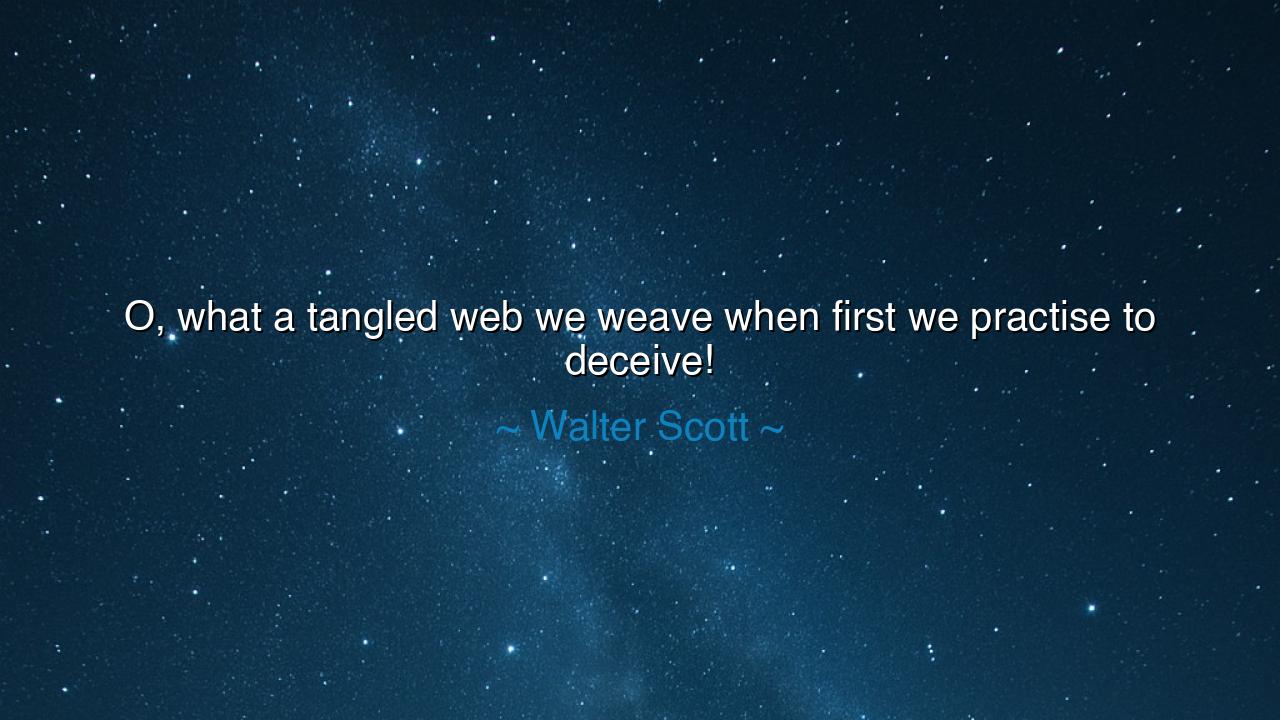
O, what a tangled web we weave when first we practise to






O children of the future, listen to the words of Walter Scott, whose wisdom speaks of the treacherous path that begins with the first lie. He declares, "O, what a tangled web we weave when first we practise to deceive!" In this declaration, there lies a deep and unsettling truth—the act of deception may begin with a single, seemingly harmless thread, but soon it becomes a web, entangling not only the deceiver but all who come near. What starts as a mere fib or excuse becomes a fortress built of lies, one that cannot be untangled without great suffering and loss.
The act of deceiving is like the weaving of a spider’s web. At first, the weaver feels the thrill of the delicate thread spun, believing it harmless, believing that the world will not see the lies woven into the fabric of truth. Yet with each additional lie, the web grows tighter, the trap becomes more intricate. What once seemed like a harmless deceit now holds the deceiver captive, ensnared in a web of their own making. No one, no matter how clever, can escape the consequences of their own actions when they are caught in the tangle of falsehoods.
Consider the tale of King David of Israel, who, in his desire to hide his affair with Bathsheba, deceived not only his own heart but the hearts of his people. To cover up his sin, he orchestrated the death of Bathsheba’s husband, Uriah. At first, it seemed that the web of deception had worked—he had covered his tracks and avoided the consequences. Yet, as Nathan the prophet came to him and revealed the truth, David’s guilt consumed him. The deception that began as a simple act of hiding truth became the source of great turmoil for him and his kingdom. His sin would follow him, and the consequences of his actions would be felt for generations.
In our own world, we see the same pattern. The politicians and leaders who twist their words, who offer half-truths, may think that their lies will go unnoticed, that they will escape the burden of their deceit. But in time, the truth comes out, and the web they have woven entangles not only their own lives but the lives of all those they have deceived. History is filled with the rise and fall of those who built their empires upon deception, from the ancient emperors to the modern figures who promised one thing and delivered another. The web of lies they wove eventually unraveled, bringing ruin to their name and their legacy.
So, O children, take heed of Scott’s warning: deception may seem like a quick and easy solution, but it is a path that leads to ruin. Each lie you weave tightens the bonds that hold you, and soon you will find yourself trapped, unable to escape the consequences of your actions. The truth, though it may seem painful in the moment, is a path that leads to freedom. Let your hearts be true, your words be honest, and may your actions be clear, for the webs we weave in the darkness of deceit will always unravel in the light of truth.






DKnguyen danh khoa
Scott’s quote resonates so much, especially when I think about how even politicians, business leaders, and celebrities get tangled up in deception. It often starts with trying to protect their image or avoid a scandal, but it snowballs into something uncontrollable. Why do you think people who seem to have everything still fall into the trap of deception? Is it the pressure to maintain an image, or is it just human nature to avoid facing hard truths?
NDNguyen Duong
This quote always reminds me of how complicated our lives can get when we start lying. It’s not just about getting caught; it’s about the mental and emotional toll it takes to keep track of all the lies. Have you ever noticed how lies make everything more exhausting? It’s like building a house on sand, and eventually, it all crumbles. Do you think there’s a way to undo the damage once you’ve started down that path?
THThu Hanh
I find this quote incredibly powerful. It highlights how even the most minor act of dishonesty can set off a chain reaction of complications. But here’s a thought: do you think we can truly avoid deceit in every aspect of life? Are there moments where a small lie might be justified—like to spare someone’s feelings or protect someone? How do we navigate that balance between truth and kindness?
KDZ Khanh Duong
Walter Scott’s words feel timeless. They remind me of how deceit often starts with a single action, but it grows exponentially as the consequences of that action build up. In some cases, people might deceive to avoid immediate consequences, but in the end, it creates a much bigger problem. Why do you think people continue to deceive even when they know it will come back to haunt them eventually? What makes it so tempting?
TLNguyen Thanh Long
This quote is so true! It really makes you think about how one small lie or deception can quickly spiral into a mess of other lies that require even more lies to cover them up. I’ve seen this happen in both personal and professional situations. It’s like you get trapped by your own words. Do you think some people lie out of fear, or is it more about trying to manipulate a situation to their advantage?